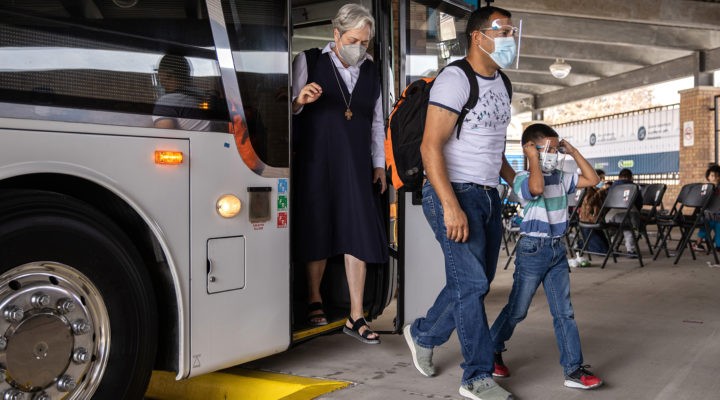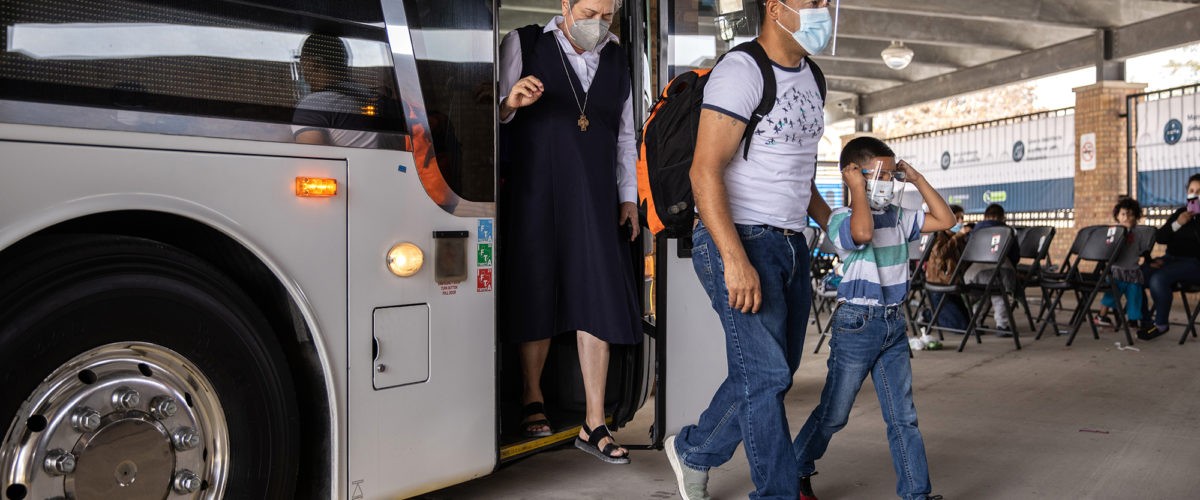The Biden administration has created a rift with immigrant advocates by announcing it plans to resume the Trump-era practice of returning asylum seekers to Mexico as they await U.S. court hearings.
The U.S. Department of Homeland Security said Oct. 15 the Migrant Protection Protocols will be reinstated in mid-November, assuming the Mexican government complies. A day later, dozens of immigration leaders staged a virtual walkout of an online meeting with White House officials.
That was followed by an Oct. 19 letter to the president and other administration leaders from dozens of law firms, legal services providers and law schools declaring “there is no way to make this program safe, humane or lawful. No measure of involvement from civil societies will mitigate the harms of this horrific, racist and unlawful program.”
In addition, the program, also known as “Remain in Mexico,” even threatens those who represent asylum seekers, the leaders warned.
“We refuse to be complicit in a program that facilitates the rape, torture, death and family separations of people seeking protection by committing to provide legal service.”
“Nor is it just for this administration to continue to force U.S. lawyers and humanitarian staff to risk their safety due to the failure of this administration to take swift action to uphold U.S. refugee laws and treaties. We refuse to be complicit in a program that facilitates the rape, torture, death and family separations of people seeking protection by committing to provide legal services,” according to the letter.
“We stand ready to offer legal services to asylum seekers, were your administration to follow U.S. and international law. But there is no protection in the Migrant Protection Protocols.”
Biden did previously attempt to end the program, but his inauguration-day order cancelling MPP was challenged by Texas and Missouri, resulting in a lower court ruling that it must be reinstated. That ruling was upheld by the U.S. Supreme Court. The court rulings centered on how the Trump policy was rescinded, not whether it could be rescinded. The difference is a much longer process.
“Following that decision, in September the Biden administration disclosed that it had begun internal deliberations about reinstating MPP and was engaged in diplomatic negotiations with the government of Mexico, and that no person could be sent back to Mexico without that country’s cooperation,” the American Immigration Council reported. Meanwhile, “the fate of tens of thousands of people subject to MPP who are still in Mexico remains in limbo.”
To improve on the program, the federal government has said it will expedite cases and expand the types of asylum seekers who will not be subject to MPP, including the elderly, sick and LGBTQ people, according to news reports. But that is all contingent on getting the government of Mexico to go along, DHS said in a recent statement.
“Mexico is a sovereign nation that must make an independent decision to accept the return of individuals without status in Mexico as part of any reimplementation of MPP. Discussions with the government of Mexico concerning when and how MPP will be reimplemented are ongoing.”
“For months, immigration advocates have asked the president and the Department of Homeland Security to issue a new memorandum to terminate MPP, and they have not done so.”
But such provisions, including Mexico’s approval, will neither reduce the cruelty of MPP nor excuse the Biden administration’s failure to find a way to end it, critics say.

Elket Rodriguez
“For months, immigration advocates have asked the president and the Department of Homeland Security to issue a new memorandum to terminate MPP, and they have not done so,” said Elket Rodriguez, immigrant and refugee advocacy and missions specialist for the Cooperative Baptist Fellowship and Fellowship Southwest. “Then, in an abrupt turn from the president’s stated position, Homeland Security announced it will reinstate MPP. This heightens our mistrust and reinforces our doubts about the real motives of the administration. ”
Previously, Rodriguez said one of the major flaws of the program is its inability to ensure the safety of asylum seekers who, before MPP was implemented in 2018, could remain in the U.S. awaiting immigration hearings.
“There is no humane way to implement MPP because neither the Mexican government nor the U.S. government can guarantee the safety of asylum seekers in the dangerous cities of northern Mexico,” he explained. “The Mexican government cannot effectively protect those asylum seekers against the cartels, and the U.S. can’t either because they are outside our borders.”
National immigration reform leaders lined up earlier in the year to praise Biden for attempting to end the program, but also to underscore its inhumane treatment of immigrants.
“From the moment it was announced, the Remain in Mexico policy has been a national sin,” Simone Campbell, executive director of NETWORK Lobby for Catholic Social Justice, told the Interfaith Immigration Coalition.
“Too many of our sisters and brothers have been condemned to lead a life of squalor at our border, simply for seeking asylum from persecution in their home countries. This sinful policy is in direct contradiction to Catholic teaching and international law. Our immigration system must respect human dignity, as well as the right to seek asylum.”
Mary Katherine Morn, president of the Unitarian Universalist Service Committee, added that a safe asylum process should be a given in the U.S.
“Yet over the past years we’ve seen this human right stripped from people at our borders, forcing thousands to wait in deadly conditions in the midst of a pandemic. It is past time for the shameful Remain in Mexico protocols, Title 42 expulsions, and related policies to end,” she said.
Related articles:
Why all the fuss about the ‘Remain in Mexico’ immigration policy? | Analysis by Elket Rodriguez
Immigration advocates applaud official end of ‘remain in Mexico’ policy


